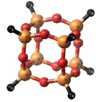|
ACS PRF | ACS |
|  |
 |
|
|
|
Home > Researcher Stories
 |

 Increased knowledge of how the fluids move beneath the surface of the earth could mean more efficient extraction techniques and decreased monetary risk for oil companies. Dr. Fischer studies paleohydrologic systems in
Mexico for clues to deciphering modern fluid behavior. Increased knowledge of how the fluids move beneath the surface of the earth could mean more efficient extraction techniques and decreased monetary risk for oil companies. Dr. Fischer studies paleohydrologic systems in
Mexico for clues to deciphering modern fluid behavior.
|
 |

 A "divide and conquer" strategy informs Dr. Parish's diverse research. Equipped with a well-armed scientific arsenal, she and her team are able to solve a wide array of challenges in the field of molecular behavior modeling.
A "divide and conquer" strategy informs Dr. Parish's diverse research. Equipped with a well-armed scientific arsenal, she and her team are able to solve a wide array of challenges in the field of molecular behavior modeling.
|

Understanding how the properties of inorganic materials are affected by shape is extremely important, particularly in the development of efficient, low cost catalysts and electrodes found in solar cells and batteries. Dr. Choi investigates electro chemical control of material shapes, in an attempt to create optimum shapes that bring about desired behavior.
|


 Dr. Shim is studying an emerging subclass of nanocrystals called nanocrystal heterostructures, in which two or more chemically distinct components are joined together. The ultimate goal is to create entirely new materials, including ones that
might have a major impact on converting sunlight into clean, hydrogen fuels. Dr. Shim is studying an emerging subclass of nanocrystals called nanocrystal heterostructures, in which two or more chemically distinct components are joined together. The ultimate goal is to create entirely new materials, including ones that
might have a major impact on converting sunlight into clean, hydrogen fuels.
|


Looking for alternative sources of energy, such as solar cells, has become an increasing priority in today’s energy hungry world. Dr. Taylor feels that the answer lies in organic, polymer-based solar cells. She
 is exploring how a particular class called poly(p-phenylenes) can be combined with a semiconductor nanostructure to improve energy conversion. is exploring how a particular class called poly(p-phenylenes) can be combined with a semiconductor nanostructure to improve energy conversion.
|


 Three organic chemists at the University of California Irvine are working on vastly different projects, from understanding the basic Three organic chemists at the University of California Irvine are working on vastly different projects, from understanding the basic
process of catalysis to being able to create new, complex molecules for use in the pharmaceutical industry.
|


 Dr. Ozerov decodes fundamental transition metal chemistry. He focuses on PNP ligands, which are unique in their rigid geometry and ability to bind to a number of elements. Dr. Ozerov decodes fundamental transition metal chemistry. He focuses on PNP ligands, which are unique in their rigid geometry and ability to bind to a number of elements.
|


 Dr. Thamattoor helps provide undergraduates with a unique and thorough training in the fundamentals of chemistry. He and his students study oxiranyl carbenes, a particular type of reactive intermediate that before now
has not been successfully generated in a laboratory. Dr. Thamattoor helps provide undergraduates with a unique and thorough training in the fundamentals of chemistry. He and his students study oxiranyl carbenes, a particular type of reactive intermediate that before now
has not been successfully generated in a laboratory.
|
 |




 Increased knowledge of how the fluids move beneath the surface of the earth could mean more efficient extraction techniques and decreased monetary risk for oil companies. Dr. Fischer studies paleohydrologic systems in
Mexico for clues to deciphering modern fluid behavior.
Increased knowledge of how the fluids move beneath the surface of the earth could mean more efficient extraction techniques and decreased monetary risk for oil companies. Dr. Fischer studies paleohydrologic systems in
Mexico for clues to deciphering modern fluid behavior. A "divide and conquer" strategy informs Dr. Parish's diverse research. Equipped with a well-armed scientific arsenal, she and her team are able to solve a wide array of challenges in the field of molecular behavior modeling.
A "divide and conquer" strategy informs Dr. Parish's diverse research. Equipped with a well-armed scientific arsenal, she and her team are able to solve a wide array of challenges in the field of molecular behavior modeling. Dr. Shim is studying an emerging subclass of nanocrystals called nanocrystal heterostructures, in which two or more chemically distinct components are joined together. The ultimate goal is to create entirely new materials, including ones that
might have a major impact on converting sunlight into clean, hydrogen fuels.
Dr. Shim is studying an emerging subclass of nanocrystals called nanocrystal heterostructures, in which two or more chemically distinct components are joined together. The ultimate goal is to create entirely new materials, including ones that
might have a major impact on converting sunlight into clean, hydrogen fuels.
 is exploring how a particular class called poly(p-phenylenes) can be combined with a semiconductor nanostructure to improve energy conversion.
is exploring how a particular class called poly(p-phenylenes) can be combined with a semiconductor nanostructure to improve energy conversion.
 Three organic chemists at the University of California Irvine are working on vastly different projects, from understanding the basic
Three organic chemists at the University of California Irvine are working on vastly different projects, from understanding the basic Dr. Ozerov decodes fundamental transition metal chemistry. He focuses on PNP ligands, which are unique in their rigid geometry and ability to bind to a number of elements.
Dr. Ozerov decodes fundamental transition metal chemistry. He focuses on PNP ligands, which are unique in their rigid geometry and ability to bind to a number of elements.
 Dr. Thamattoor helps provide undergraduates with a unique and thorough training in the fundamentals of chemistry. He and his students study oxiranyl carbenes, a particular type of reactive intermediate that before now
has not been successfully generated in a laboratory.
Dr. Thamattoor helps provide undergraduates with a unique and thorough training in the fundamentals of chemistry. He and his students study oxiranyl carbenes, a particular type of reactive intermediate that before now
has not been successfully generated in a laboratory.